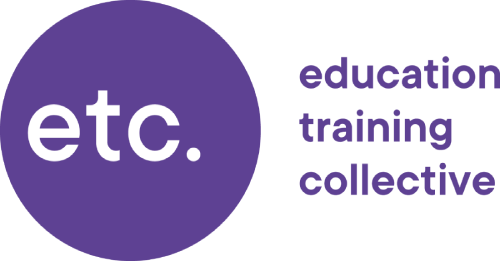By Grant Glendinning, Chief Executive Officer, Education Training Collective (Etc.)

We are living through one of the most profound transformations in the history of work. In the space of five years, our relationship with work may have changed more than in the last 50 — not only through technology, but through shifting attitudes, new expectations and a growing realisation that the future will be defined by how well we adapt.
For those of us working in further education, this is more than an academic conversation. Our colleges sit at the junction between education, employment and innovation. We are preparing people not for a single job or career, but for a lifetime of change.
So, what does the future of work really look like? I think there are three interlinked strands shaping it – how people’s attitudes to work are changing, the types of skills we’ll need in the years ahead and the unstoppable revolution of artificial intelligence (AI) that will influence almost every role.
Attitudes have shifted
The pandemic was a watershed moment for how people view work. In a matter of weeks, millions of workers moved from offices to kitchen tables and “hybrid” became the new normal. But this was more than a logistical change — it was a psychological one. People began to reassess what work meant to them – especially in the wider context of the whole that is their life and the other roles they play.
According to Deloitte’s 2025 Gen Z and Millennial Survey, younger workers are now more focused on wellbeing, flexibility and purpose than on pay or promotion. They want feedback, transparency and authenticity from their leaders. McKinsey’s research adds that Gen Z employees actively seek work that reflects their values — and they are prepared to leave if it doesn’t.
That’s a big shift from earlier generations who tended to define themselves by their work. Today’s workforce is far more likely to question, “Does this work fit into my life?” rather than, “How do I fit my life around work?”
And as Generation Alpha — today’s school children — begins to enter further education and the workplace, those expectations will change again. This is a generation that has grown up with Alexa, spent their play time with smart devices and increasingly with AI companions. They’ll expect instant access, personalisation and flexibility as standard. For them, digital tools aren’t “technology” — they are just life.
Just over the weekend I witnessed a child ask their parent if they still had hold of the phone – but they didn’t signal this with the hand to ear gesture I know, instead used their thumbs to indicate typing on a screen. Life is different.
All these changes, mean that for employers, work must be meaningful, inclusive and aligned with personal values. For educators, it means our learners need not just skills, but clarity of purpose — a sense of who they are and what they want to contribute.
All of this needs to fit within the realms of the world they know and operate as part of.
In short, people now want work that matters. And that has deep implications for how we design curricula, shape careers guidance and define success in further education.
Future skills and the human advantage
If attitudes to work are changing, then so are the skills that matter most.
The World Economic Forum predicts that 44% of workers’ core skills will change in the next five years. Technical competence remains essential, but the ability to learn, unlearn and relearn will be even more valuable.
Employers increasingly talk about “hiring for culture and training for skills.” What they mean is that behaviours — adaptability, collaboration, curiosity, empathy — are now the most enduring differentiators.
McKinsey’s Future of Work report notes a steep rise in demand for social and emotional skills, even in technical roles. It’s not that technical skills are becoming obsolete — they’re just evolving too quickly to be the only focus.
For FE, that’s both a challenge and an opportunity. Colleges have always been strongest when learning is applied, practical and connected to real work. But the next phase of that evolution is to weave meta-skills — learning agility, problem-solving, communication, ethical reasoning — through every programme.
That doesn’t mean we should abandon technical content. Far from it. But we do need to teach it in ways that prepare learners for reinvention. The reality is that the qualification someone earns at 19 might not match the job market at 29. What matters is that they know how to keep learning, adapting and contributing.
The FE sector is already leading this change, responding to Local Skills Improvement Plans and through initiatives such as digital bootcamps and T Levels. But we must go further – by embedding cross-sector projects, real-world AI tools and employer co-design into our courses, we can create learning experiences that are as dynamic as the world of work itself.
The unstoppable rise of AI
I used to say that Chat GPT is only as old as the shoes I wear. I’m not sure that’s now the case, but it’s impossible to talk about the future of work without talking about AI.
Artificial intelligence is not a distant threat or opportunity — it’s part of the world of work right now. McKinsey’s State of AI 2024 report found that 78% of global companies are already using AI in at least one business function, compared with 55% just a year earlier. That is an astonishing rate of adoption over the lifetime of a pair of shoes.
AI is already capable of performing a vast range of tasks once thought to require human intelligence — from legal research to customer service, from medical diagnostics to writing code. Amazon Web Services, for example, can now automate entire finance or HR functions.
What does that mean for work — and for education?
Some jobs will certainly disappear. McKinsey estimates that roughly a quarter of current roles could be largely automated in the next decade. But it must be true to say that nearly every job will change.
At its best, AI has the potential to make work more meaningful. It can take away the dull, repetitive, administrative parts of our roles, freeing people to focus on creativity, collaboration and care. Imagine the world where teachers spend very little time on paperwork and almost all their time inspiring learners; or when healthcare workers’ time is entirely with patients, with virtually none on data entry systems.
But the transition won’t be painless. Not all sectors or communities will benefit equally.
That’s why FE’s role as the bridge between education and employment has never been more important. We are the system best placed to help people retrain, reskill and reinvent themselves. But we will need to be as agile as the world we serve.
The risk of forgetting the human
In outsourcing more and more of our thinking to machines, are we at risk of deskilling ourselves?
I think of the brain as like a muscle: if you stop using it, it weakens. You need to use, access and strengthen neural, synaptic pathways. This is why musicians practise and the more you do mental arithmetic the better you get at it.
AI can make our work more efficient, but it can also make us intellectually passive if we’re not careful. If technology does all the planning, analysis, problem-solving and even creativity, I am genuinely concerned we risk dulling our own cognitive abilities.
That’s why education must remain fundamentally human. Technology should augment, not replace, our capacities.
For FE, that means teaching digital and technical fluency alongside critical thinking, ethics and creativity. It means ensuring that learners understand not just how to use AI, but when to use it — and when to rely on their own judgement instead.
When the first Large Language Models became available to all, understandably, this prompted a moral panic about plagiarism. But this was such a narrow focus. The benefits of AI in education are enormous, and colleges are already showing how to get this balance right. They are experimenting with AI tools for teaching and assessment, but they’re doing so with a focus on pedagogy and purpose.
The challenge now is to embed that same balance across the curriculum: human plus machine, not human versus machine.
5. Implications for Further Education
So, what should we take from all this?
First, FE providers must keep scanning the horizon. The world of work is evolving faster than our systems can currently respond, and curriculum lag is a real risk. Strong partnerships with employers, local authorities and regional skills boards will be essential to stay aligned with future demand.
Second, staff development is paramount. Educators need confidence not only in digital tools but in the pedagogy of digital learning. Professional development should focus as much on curiosity and experimentation as on compliance.
Third, we must design our offer around the whole learner. Gen Z and Gen Alpha students want meaning, autonomy and belonging. FE is well placed to deliver that through authentic learning experiences, industry placements, and supportive college cultures.
Finally, we should not lose sight of FE’s moral purpose. Our sector has always been about inclusion — giving people second chances, new starts, and pathways to meaningful work. That mission is more important than ever. As technology reshapes the economy, FE must remain the system that ensures no one is left behind.
Sources referenced:
Deloitte (2025) Global Gen Z and Millennial Survey; McKinsey & Company (2024) The State of AI and A New Future of Work; World Economic Forum (2023) Future of Jobs Report; Vantage Circle (2024) Gen Z Expectations at Work; Goldman Sachs (2024) Jobless Growth and AI.
